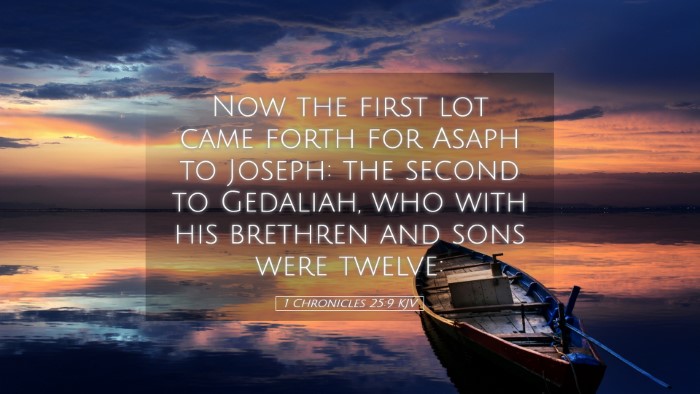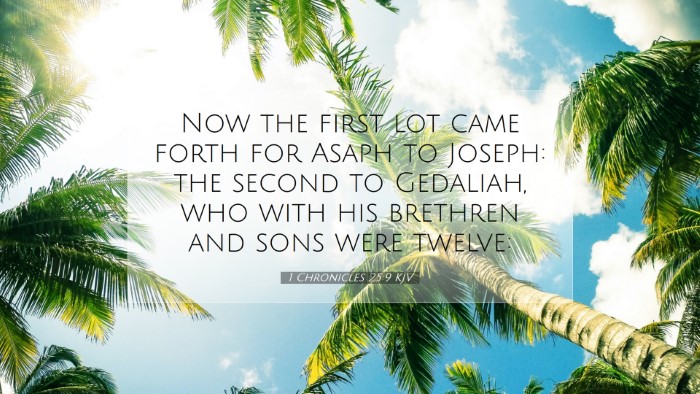Commentary on 1 Chronicles 25:9
Verse Text: "And the first lot came forth for Asaph to Joseph: the second to Gedaliah, who with his brethren and sons were twelve."
Introduction
This verse introduces the beginning of the organized musical ministry in the Temple of Jerusalem, which was instrumental in the worship life of ancient Israel. The service of the Levites, particularly musicians, is outlined with a focus on their significant role during worship. Public domain commentaries from various scholars provide insights that reveal the contextual importance and spiritual implications within this verse.
Historical Context
The ordering of the Levitical musicians is evidenced in this passage, reflecting King David’s dedication to worship and the corporate responsibility for liturgical music. Matthew Henry notes the importance of these musicians as they were assigned roles that contributed to the atmosphere of worship, calling attention to the holiness of the Temple service.
Division of Duties
In this chapter, the division of musical duties among the descendants of Asaph, Heman, and Jeduthun is crucial. As noted by Albert Barnes, “The arrangement of the musicians is indicative of the high priority given to music in worship.” The division into courses allowed for organized service and encouraged collective participation in worship, emphasizing the communal aspect of exaltation and praise.
Key Elements Explored
- Asaph’s Role: Asaph was a prominent figure in this arrangement, recognized as the chief musician. Adam Clarke elaborates on Asaph’s lineage and significance, highlighting that his descendants contributed greatly to the Psalms, thus linking the music of the Temple to scriptural worship.
- Gedaliah’s Duty: Gedaliah’s assignment signals the breadth of talent within the Levitical musicians. His grouping of twelve shows the significance of representation and unity among God’s people in worship. Barnes indicates that this shows the collaborative nature of leading worship, meaning more than individuals—community is vital.
- Symbolism of Numbers: The number assigned to Gedaliah and his brethren (twelve) resonates with the twelve tribes of Israel, reflecting completeness and divine order. Henry comments that this emphasizes God’s sovereign administration in the organization of His worshipers.
Theological Significance
The dedication to music in worship speaks volumes about the character of God who is worthy of praise. Clarke underscores the inherent belief that music has a capacity to uplift the soul and facilitate a deeper connection with God. The service of the musicians signifies an acknowledgment of God’s presence and reflects the fulfillment of His promises to Israel.
Worship as a Community Experience
The structured organization of musicians fosters a community that worships together. This reflects a broader theological principle that worship is not merely an individual practice but a corporate activity wherein the community glorifies God together. Acknowledging each musician’s role enhances the worship experience, leading to an atmosphere of shared reverence and unity.
Lessons for Modern Worship
For contemporary worship leaders and churches, this passage offers several lessons:
- Importance of Organization: Just as David organized the Levites, modern congregations benefit from structured ministries where each member understands their role, contributing to a seamless worship experience.
- Encouraging Participation: Creating spaces where congregants are encouraged to engage in worship reflects the collaborative spirit seen in Chronicles. This practice fosters a community culture where all feel valued.
- Cultural Relevance of Music: Recognizing the historical importance of music can inspire today’s worship leaders to embrace diverse styles that resonate with their congregants, much like Asaph and his descendants were likely to innovate in their musical expressions.
Conclusion
1 Chronicles 25:9 serves as a critical reminder of the value placed on worship within the community of God’s people. The passage encourages a view of music as a vital element of worship and reinforces the idea that structured services enhance the spirit of reverence and unity among congregants. For pastors and theological students, this verse opens pathways to reflect deeply on the role of music in the Christian faith and its implications for communal worship practices.


